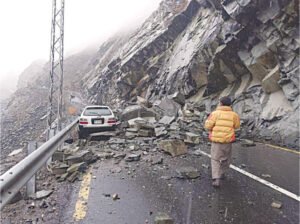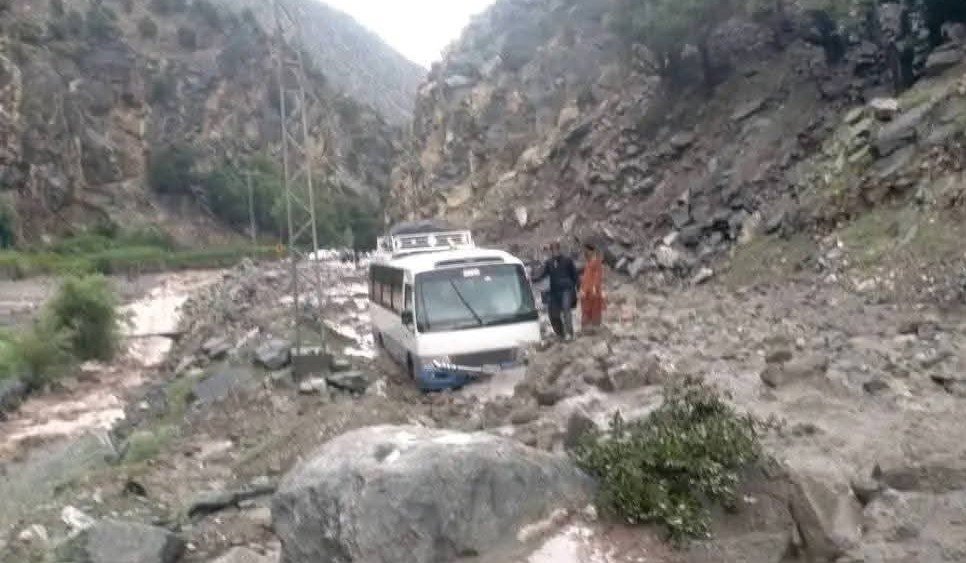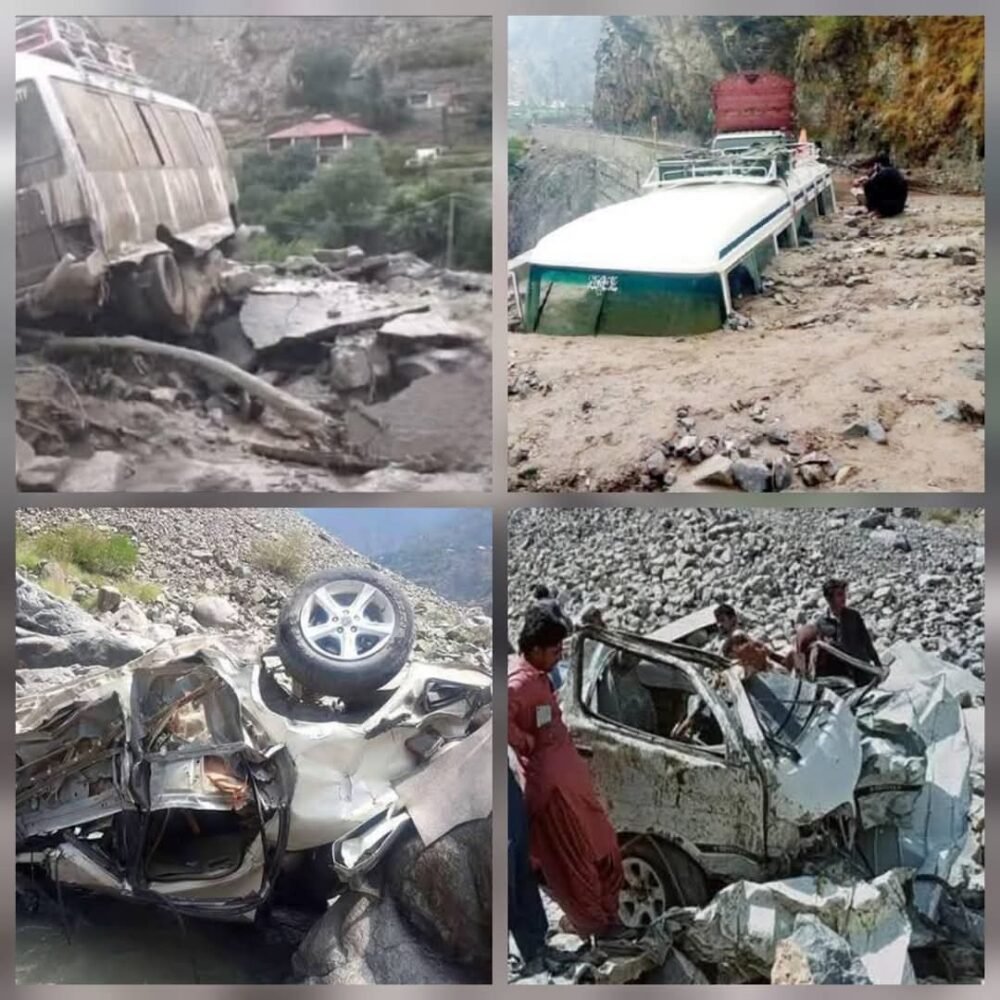by Safiullah Baig
The recent devastating floods and ecological disasters in Gilgit-Baltistan are not isolated natural events. They are the direct consequence of 77 years of colonial occupation, chronic misgovernance under non-local bureaucratic rule, the systematic plunder of natural, cultural, economic, and social resources, and the elimination of local governance, which has entirely excluded the region’s population from decision-making processes. The ultimate responsibility lies with Pakistan’s ruling elite and their local collaborators.
Environmental destruction in Gilgit-Baltistan is not merely the result of deforestation, as some commentators suggest. To reduce these growing catastrophes solely to forest degradation is to whitewash the deeper failure of the colonial governance model imposed on the region. Global imperialist capitalism and resource-driven wars have set the planet ablaze—disrupting ecosystems, accelerating biodiversity loss, and destabilizing natural climatic balances.
Gilgit-Baltistan is not a constitutional part of Pakistan, nor is it a conquered territory. This is an undeniable international legal reality, supported by UN resolutions on the Jammu and Kashmir dispute, the Constitution of Pakistan, Supreme Court verdicts, Post-Partition historical records, statements from Pakistan’s Foreign Ministry, recent ISPR briefings. All of these documents affirm Gilgit-Baltistan’s status as part of the unresolved Kashmir dispute.


Following the Partition, amid the post-WWII geopolitical landscape and under British imperial influence, Pakistan’s ruling elite took direct administrative control of Gilgit-Baltistan, the largest province of the former State of Jammu and Kashmir, through the secret Karachi Agreement of 1948.
Maintaining colonial British administrative traditions, the region was demoted to an “agency” under a Tehsildar. This extra-constitutional and colonial arrangement remains intact to this day. Its core purpose being to exert total control over Gilgit-Baltistan’s strategic geography and vast natural resources, particularly its water and mineral wealth.
For over seven decades, Pakistan’s ruling class has failed to establish a stable political system in Gilgit-Baltistan. Instead, over 2 million residents remain deprived of basic infrastructure and facilities, political representation, and meaningful autonomy. In the name of strategic security and economic partnerships, successive governments have ceded territory to China and India (1962 border agreement, 1971 war losses, Siachen Glacier occupation in the 1980s).
The Pakistan government captured vast land under the garb of establishing national parks to solidify disputed borders and deprived local communities of their traditional mainstay of livelihhod.
Islamabad constructed the Karakoram Highway (KKH) and signed trade agreements and built infrastructure without local consent and consultation. It created seven more national parks in recent past to tighten control over natural resources. It planned massive dam projects like the Diamer-Bhasha Dam—a 100km long, 87 million-acre-foot water reservoir capable of producing 4,500MW electricity—all without consent from the local populace. Such actions have displaced communities, undermined food sovereignty, and fueled ecological instability.
Militarised environmental degradation
Gilgit-Baltistan’s fragile ecosystem is now further endangered by militarisation from both India and Pakistan, who exploit the region as part of the profitable Kashmir conflict industry. The deployment of thousands of troops on glaciers and mountain ranges like Siachen, combined with extensive infrastructure and energy demands in freezing climates, is accelerating glacial melt and topographical disruption.
Moreover, colonial governance has destroyed traditional agriculture and food systems, making the region dependent on outside supply chains. Urban expansion without environmental planning has turned towns like Gilgit, Skardu, and Hunza into concrete jungles.
Vital services—education, health, water, energy—have been privatised or handed to NGOs under the guise of development, further marginalising the public.
Under the colonial framework, resource extraction has become institutionalized Pakistan earns over Rs50 billion annually from the Sost Dry Port on account of Customs duty and other taxes.
Military-run entities — NLC, FWO, SCO and NHA earn from transport, logistics, infrastructure tolls, and contracts, Special Communications Organisation (SCO) monopolises telecommunications. Mineral exploration and extraction leases are granted to foreign and locsal elite-owned corporations, tourism assets are handed over to Green Tourism Company, yet another military-run entity.
Flagship hotels like Serena, PC, and others dominate the tourism economy while funneling profits out of the region. Local police are sidelined while Rangers and FC forces occupy the area under security pretexts, draining billions in funds.
Despite extracting over Rs300 billion annually, Pakistan’s federal government pays back only around Rs120 billion, much of which is spent outside the region. Projects like the poorly-engineered N-15 highway through Babusar Pass show blatant disregard for ecological fragility—accelerating glacial retreat, altering river flow, and increasing risk of floods and landslides.
Historic corruption by administrators has long been entrenched—from the sale of priceless Buddhist relics to the relocation of ancient monuments. Gilgit-Baltistan’s entire natural and cultural heritage is treated as a market commodity, not a public trust.
Global studies confirm that climate vulnerability is directly linked to governance and economic systems. In Gilgit-Baltistan, temperatures rise at twice the global average. Yet no effort has been made to establish sustainable energy systems, public transportation, or eco-friendly urban planning.
Instead, unregulated tourism, infrastructure projects, and fossil fuel use have wreaked havoc on biodiversity and natural cycles.
Projects like the Atabad Lake tunnels—a product of landslide mismanagement turned into a tourist attraction—are maintained not for public utility but for profiteering. Even disaster response has become a business of commissions and contracts.
The colonial governance system has erased indigenous knowledge, suppressed local governance, exploited the region for state and corporate profit, undermined food, water, energy, and climate security.
The imposed Presidential Order and a puppet assembly mask the absence of true autonomy. For instance, in 2023–24, the Governor Secretariat’s budget was 194.9 million PKR, with 122.9 million under the Military Secretary, and 7.2 million spent on gifts and entertainment—none of which supports local development or ecological preservation.
Self-governance path to ecological justice
Protecting Gilgit-Baltistan’s critical ecosystems—which regulate solar energy, store freshwater, and stabilize climate for over 2 billion South Asians—is impossible under the current colonial system. True environmental and social justice requires full political and administrative autonomy for the people of Gilgit-Baltistan. Only then can sustainable development, climate resilience, and equitable resource management take root.
Pakistan’s ruling elite must be held accountable for repeated ecological disasters and socio-political exploitation. The youth and people of Gilgit-Baltistan must now prioritize the dismantling of the colonial regime and the protection of their environment, both locally and globally.

Safiullah Baig is a heritage and environmental expert, focused on nature-based tourism, and a political activist who analyses the destruction of nature by colonial and capitalist economies from a Marxist perspective.

The High Asia Herald is a member of High Asia Media Group — a window to High Asia and Central Asia

